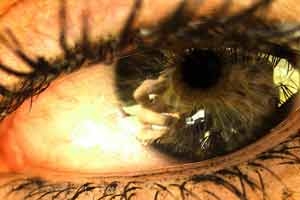How to Stop Lip Biting
5 tips to help you stop abusing your smackers
 "Lip biting" courtesy of lucyburrluck
"Lip biting" courtesy of lucyburrluckBy a series of coincidences and misunderstandings, I'd ended up at an afternoon cocktail party for local SIPs (semi-important people) and found myself chatting urbanely to a distinguished gentleman about affairs of the day. He was a local dignitary. I thought I was being lucid, engaging; a man of the world. He was using long words and so was I.
Pride really does come before a fall. As he spoke earnestly, my teeth missed the hors d'oeuvre for which they'd been aiming and I bit painfully into my own lip. Ouch!
You'd think that after a lifetime of eating practice, these kinds of nibbling errors would have been ironed out. I winced, pretending that nothing was awry as pain stabbed my lower lip like Norman Bates in a motel shower. Said suited man continued talking (still using long words). I nodded manically and wondered if he questioned why his ideas on local car parking were causing my eyes to fill with tears.
That experience was an idiotic accident, but some people bite their own lips habitually when they're nervous, bored, stressed, or distracted. Lips are living things that can be pierced, shredded, ripped, and torn, leaving them bleeding and scabbing.
Ouch again!
If you want to stop biting your lips habitually, follow these tips and, like me, you'll reduce the incidence of auto-lip-biting to just the very occasional mis-chew.
1) Spot your own triggers
The clue is in the word: 'e-motion'. Emotions want motion, movement. Whether we're anxious, angry, or elated, we want to move. But lower-level emotions (such as a 'background' sense of stress or excitement) also want us to move (though perhaps minimally); this 'movement' may manifest as nervous throat clearing, hair pulling, scratching, or...lip biting.
Think carefully about any times when you might typically dine on your own flesh. Is it more likely to happen when you're tired, upset, angry, or worried?
2) Stop lip biting but keep moving
Knowing your own danger times and planning to break the habit is a first step. Ted bit his lips often, usually when he was anxious about his work. He noticed that he was more likely to lip bite in the evenings, after work, in the hour before eating his evening meal.
Since his emotion wanted motion, I suggested he use this 'danger hour' to tend his garden before eating. Rigorous digging and focussed planting meant that his need to move (brought about through stress) was now being met constructively. It was a start and certainly helped him diminish his lip biting.
3) Deal with stress directly
When we relax completely, we can find real stillness. As you rest deeply and stress chemicals within you diminish, your arm, leg, and back muscles all relax and so become still and peaceful. No fight, no flight; just stillness.
The fact is, when you're that relaxed, you don't feel like moving. The more relaxed you feel in the day, the less you'll feel the need for unnecessary moving/lip biting. As is the case with exercise, the benefits of relaxation don't just exist during the relaxation period itself. If you take time out to relax for twenty minutes a day, you'll feel more relaxed for many hours afterwards.
Regular relaxation is vital, so listen to a calming audio session. And if possible, relax before a period when lip biting had typically been more likely to happen.
4) Use the 'scramble technique'
The more we do something - anything - the more automatic it becomes and the more we do it unthinkingly. So sometimes the habitual pattern can be so automated that it continues even after you've dealt with the stresses in your life and started to relax a great deal more.
When we talk about 'reprogramming' the mind, we really mean breaking an old pattern in order to reintroduce greater flexibility. And everything we do can be broken down into parts. For example, I asked Ted to 'teach me' how he did his lip biting. How did he know when to start, or to finish? After some thought, we'd broken his lip biting pattern down into these steps:
- A building sense of tension in his whole body.
- Suddenly catching himself biting his lips.
- Feeling an initial sense of relief.
- Wanting to bite some more.
- Starting to feel pain and sometimes notice blood.
- Increasing pain.
- Stopping, either when his lips were too painful or he became distracted by something else.
I then asked Ted to close his eyes as I read out all his lip biting steps in order. As I did so, Ted imagined the feeling of each step in turn (without actually biting his lips).
We did this a couple of times to make sure it 'felt right'. Then we began to scramble the pattern. I got him to start at step 6, then to get a sense of number 1, then 7. Pretty soon, the whole pattern had become so scrambled in his mind that he couldn't get the feelings of the old pattern. He felt this was the single most powerful factor in helping him stop lip biting.
Write out your steps (which can be feelings, actions, or both). Then close your eyes and practice accessing the feelings and imagining the actions for each step. Do this in order to begin with, then start to mix it up until it feels difficult to access the old pattern.
5) Use self-hypnosis to stop lip biting
Actually, the scrambling technique is a hypnotic induction in itself (a hypnotic induction and technique can sometimes be as one), but there are other ways to use hypnosis to help you stop biting your lips. Close your eyes and focus your mind on really connecting to your lips. Almost as if you can talk directly to them.
Tell them (and this doesn't sound so crazy when you're actually doing hypnosis) that from now on, you're going to protect them from the teeth because they are not food. Next, talk to your teeth and tell them that they are very useful, but have been counterproductive and that your lips now need them to focus just on useful chewing. Then begin to visualize yourself from the outside in situations in which you used to lip chew; but now, watch your lips and teeth living in harmony, respecting one another, and you looking so much more generally relaxed and at ease.
You know, the unconscious mind is amazing. Ted had been my last client of the morning. An hour and a half later, I bit into my own lip. At that point it suddenly dawned on me - not just as an idea, but as a reality - how painful it must have been for Ted for all of those years.





